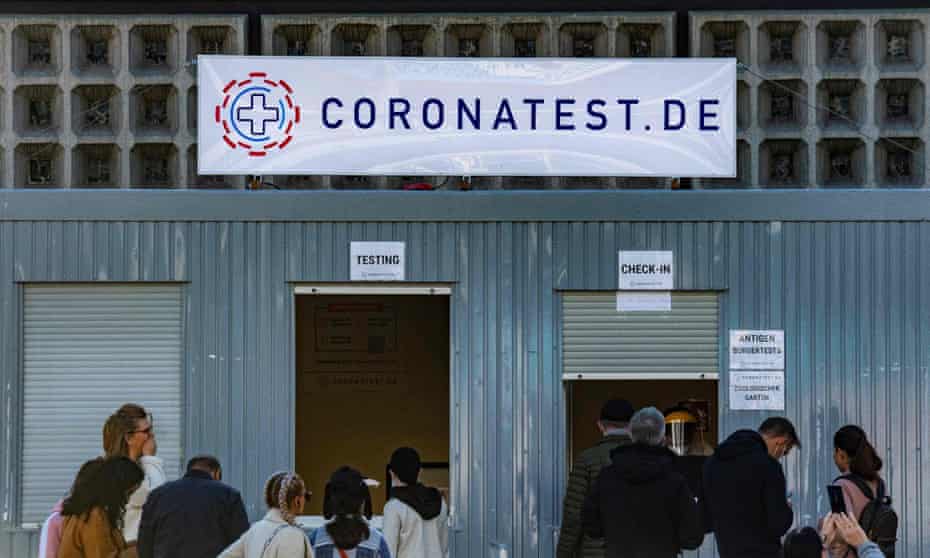Several European nations have questioned British response but there are growing signs of fresh wave across continent

For the past several weeks, many western European countries have been eyeing Covid case numbers across the Channel with mounting trepidation.
“Why does Britain have more than 40,000 Covid cases a day, and why is it the European country with the most infections?” asked Spain’s ABC, while France’s L’Express criticised “disastrous myopia” in London.
“Fear returns to London,” said Italy’s Corriere della Sera after the British health secretary, Sajid Javid, suggested cases could hit 100,000 a day over the winter. “How many deaths are [the British] willing to tolerate not to renounce their liberty?”
But while infection rates in Britain continue the rapid surge they began in mid-September, western European countries with comparably vaccinated populations are now also seeing case numbers start to pick up, sparking fears of a fresh wave there.
According to OurWorldinData, the UK recorded a rolling seven-day average of 666.5 new cases per million people on Wednesday, compared with 40 in Spain, 44.5 in Italy, 80.2 in France, 146.7 in Germany, 223.3 in the Netherlands and 328.8 in Belgium.
The incidence rates were up in all six continental countries, and dramatically so in some: Belgium’s government on Thursday recommended face masks and working from home again after the number of new cases in the country rose by more than 40% in three days.
“We are clearly in a fourth wave,” said the Belgian health minister, Frank Vandenbroucke. “We will see a major increase in infections and, unfortunately, hospital admissions.” Testing will be free for people using a government website to check their symptoms.
In the Netherlands, new daily cases have more than doubled over the past two weeks. In Germany, which had maintained a rate of about 100 new cases per million since mid-September, daily infections have leapt by about 40% in a week.
France – where MPs voted on Wednesday night to allow use of the country’s vaccine passport until next summer if necessary – and Spain have both recorded 17% increases in new daily cases over the past seven days, and Italy a rise of nearly 6%.
For many in western Europe, the UK’s decisions to relax almost all physical distancing restrictions this summer, abandon the face masks still mandatory in indoor public spaces on the continent, and refuse to implement a Covid pass were to blame for its fourth wave.
Mario Draghi, the Italian prime minister, said last week that the UK’s example “teaches us we won’t get out of this in an instant. Having abandoned all caution, it is faced with 50,000 daily infections and 200 deaths daily. The exit needs to be gradual.”
Some experts, however, have suggested that the UK may also be feeling the effects of its fast early vaccine rollout, since a larger proportion of adults than in western Europe have now reached the point, five or six months on, where vaccine effectiveness starts to fade.
If only for that reason, while western European infection rates may remain lower than in the UK thanks to more widespread use of face masks and tighter restrictions, a fresh wave of some description is all but inevitable on the continent, they suggest.
The French government’s health advisory council said last week that the virus would be “circulating more widely” over the coming weeks, stressing that vaccine protection wanes over time and it would “probably” be recommending booster shots for all soon. They will need to be administered fast, doctors have said.
If third doses are the answer, however, there is little faith that Britain can deliver them to its people. In Germany, Stern magazine said that 100 days after “freedom day” there was “not much to celebrate in Britain”. Faced with a lagging campaign for young people and a slow rollout of booster shots, it said, “doctors are asking: what’s plan B?”
El Mundo agreed. Britain’s “main tool for trying to contain another possible wave during the last four months of the year is the booster shot”, the paper noted. “But having once led the world, the UK has significantly relaxed its vaccination rhythm.
“It has fallen behind Spain, France and Italy when it comes to the percentage of the population that has been fully vaccinated – and is now also having problems when it comes to the third dose.”
Reporting by Jon Henley in Paris, Sam Jones in Madrid, Kate Connolly in Berlin and Angela Giuffrida in Rome

Leave A Comment